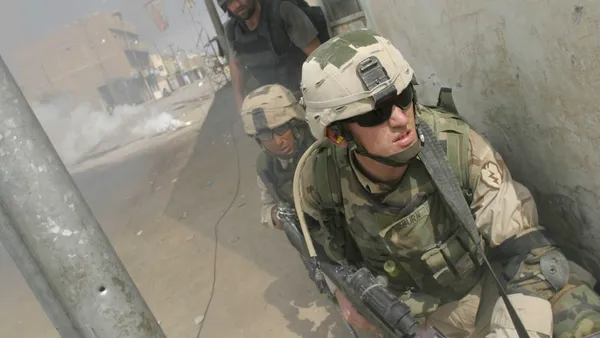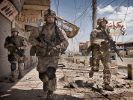Eye For Film >> Movies >> Only The Dead (2015) Film Review
Only The Dead
Reviewed by: Jane Fae

Only the Dead is dark. Very. A dark and disturbing exploration of war and, darker still, the impact of reporting on war - a textbook illustration of what happens when you look into the abyss.
Billed as documentary, Only the Dead is approximately documentary in form - a collage of footage never before shown, based on film shot by Time magazine war correspondent Michael Ware. Under the joint direction of Michael Ware and Bill Guttenberg, the film gains a narrative arc and a shaping that takes us from before the start of the 2003 Iraq War, through to the first sputtering explosions of insurrection, the siege of Fallujah and, finally, hell in Ramadi.

This shift is marked by the change in tone as much as content. In the beginning, our war correspondent/hero flies in by helicopter to an accompaniment of dramatic warlike music. This is journalist superman - the outsider arriving, filming, explaining. Early footage, shot alongside Kurdish rebels in the north of Iraq is gung ho, Boy's Own adventure stuff. Fresh-faced correspondents laugh as mortar shells fall around them, only occasionally pausing to note that “that was close” - and perhaps there is consequence here.
The facade of detachment begins to slip with the invasion proper, and a move into a house shared with a posse of journalists in Baghdad. Death is no longer distant - the camera lingers on the faces of friends, not all of whom, Ware explains, survived the war.
His journey into darkness begins with the gradual emergence of armed opposition and his desire to see and shoot the war from the other side. Over weeks, months, he scratches away, breaking down barriers, making contacts until little by little, he is allowed in - taken under cover of night to film first meetings, and then attacks on the American occupation.
Why take such risks? He doesn't exactly know, though the language in which he describes his constant itch to be out there, to be at the very heart of the action bears all the hallmarks of the addict.
Dangerous? Undoubtedly. Morally dubious? Perhaps. But then, Ware IS his camera. He may be present behind the lens: yet that, at times, is little more than necessary inconvenience. He comments little. Instead, the audience is invited, along with Ware, simply to look.
Besides – that narrative arc again – the insurrectionists, fighters, resistance with whom Ware briefly embeds are mostly reasonable people. They may kill American soldiers, inflict collateral damage, but these are not a patch on what is to come - the vicious fundamentalist war that will be waged by al-Qaeda leader Abu Musab Al-Zarqawi, complete with public beheadings and the full panoply of terror tactics that presage those deployed by Islamic State/ISIS.
Here, the vantage point of Ware's camera switches back. The second half of the film is very much the story of the rise (and fall) of al-Zarqawi, but told from behind American lines. Footage of al-Zarqawi, of his organisation, is limited to what they deliberately put out there.
For – the contrast is implicit – those militants with whom Ware dealt before were just so many pussycats. The one time he does directly encounter al-Zarqawi's forces, he comes within minutes of being beheaded - an experience that left him with a lingering fear of shaving. He is saved only through the intervention of a “moderate” terrorist, the commander of one of those groups he filmed with earlier.
In Fallujah, he accompanies American troops fighting their way back into that town, and finally Ramadi where, he observes, the Americans have garrisoned just a third of the number of troops they need to hold the town safely.
In both, the risk and fear of instant death is palpable – and indeed, there is much death throughout this film. Sudden, graphic, bloody. There is something both mundane and disgusting about watching a body, one minute so alive, the next just a sack of flesh and bone being dragged through the streets.
And yet, for those familiar with the grammar of war, none of this is new or surprising. What left me disturbed in the extreme were Ware's choices. In Fallujah, his decision not simply to hang back and film, but to enter a house packed with insurgents and to record, in pitch blackness, the firefight going on around him. Deathwish? Or was he so sure of his own invulnerability that he no longer cared.
Then finally in Ramadi his stepping back, hiding behind the camera when speaking up, as he himself admits, might just have averted what looks like Allied atrocity. The point when, by his own admission, he “became the man he never thought he could be”.
The film raises obvious questions. How close should journalists go to the action? Are there groups too dangerous or simply too lacking in common human values to film. I do not believe, as I suspect some critics might, that this film “gives succour” to an enemy.
In fact, it made me realise, as someone who thought they knew what happened in Iraq (because like everyone else, I spent years watching events unfold on the evening news so of course I knew!), that there was a bigger picture.
Still, it left me with questions unanswered about the central character, about Michael Ware, who is almost perpetually out of shot, yet constant invisible presence. This is about him, his journey and while some may appreciate the detachment of documentary footage, it left me frequently frustrated – brimming with questions I wanted answered – not even asked on screen.
Don't get me wrong, this is an important work; worth watching if you want to dig into one of the messier wars of our time. And it is absolutely not for everyone. Not for those who want their war films to possess a more certain moral compass and certainly not for those who dislike blood and death. Four out of five stars all the same.
Reviewed on: 15 Feb 2016
















